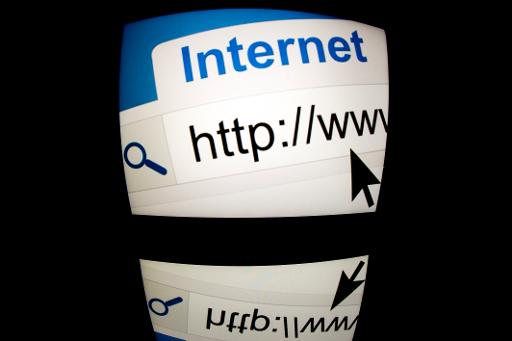US to relinquish key oversight role for Internet
The US government announced Friday it was giving up its key role overseeing the Internet’s technical operations, handing over those functions to “the global multi-stakeholder community.”

A picture taken on March 15, 2013 in Paris shows the screen of a computer connected on the internet and displaying a webpage
The move “marks the final phase of the privatization” of the management of the Internet domain name system, said a statement from the US Commerce Department.
The US agency called for “global stakeholders to develop a proposal” for a transition to a new plan with the Internet Corporation for Assigned Names and Numbers, a non-profit group that took over some of the functions in 1997 under an agreement with the US government.
The decision comes with Washington under pressure following revelations about vast surveillance programs operated by the secretive National Security Agency to collect intelligence and other data through a variety of methods.
ICANN leaders said during a conference call that the move by the US was a sign that the organization has matured and that it was in the works long before leaked documents showed massive online snooping by intelligence agents.
“Every president, every board of ICANN since its inception has been working toward this day,” ICANN president and chief executive Fadi Chehade said during a conference call.
No immediate impact
The end of the US oversight role has no immediate impact for Internet users, and ICANN will continue to administer the network’s key technical functions.
The change affects US government oversight of “root zone” of databases underlying the Internet which makes Washington a steward of that system, even though the functions are contracted out to ICANN and the infrastructure company Verisign.
“The timing is right to start the transition process,” said Assistant Commerce Secretary Lawrence Strickling, who added that he looked forward to “an appropriate transition plan.”
The statement said the US hopes to “support and enhance the multi-stakeholder model,” and “maintain the openness of the Internet” under any new system.
ICANN said its role as administrator of the Internet’s unique identifier system remains unchanged.
“The Internet’s Unique Identifier functions are not apparent to most Internet users, but they play a critical role in maintaining a single, global, unified and interoperable Internet.” ICANN said.
Unanswered questions
But the change leaves some questions unanswered on the future stewardship of the Internet.
Daniel Castro of the Information Technology and Innovation Foundation said the United States “was bullied into making the change” due to pressure over the revelations of leaked NSA documents from former contractor Edward Snowden.
“The Snowden disclosures are merely a pretext,” Castro said in a blog post.
“While the NSA revelations have rightly angered many people around the world, they have nothing to do with Internet governance. The US Department of Commerce has not once abused its oversight of ICANN to aid the intelligence community.”
Castro said the change opens the door to other governments such as Russia or China modifying the Internet architecture for political reasons.
Without US oversight, “ICANN would not be accountable to anyone, and would be motivated only by the interests of those individuals who control the organization,” the analyst added.
Greg Shatan, a US lawyer who is a member of an ICANN working group, said the change is “a big deal,” but that Washington is not walking away entirely from its role in the Internet.
The change affects “the plumbing of the Internet” but ICANN still has obligations to the US under its “Affirmation of Commitments,” Shatan added in an email.
“By making this announcement, the US is trying to make sure the transition happens on its own terms, and that the US is setting the rules for the transition.”
The European Union recently called for these modifications, but some other countries have been seeking deeper changes, such as placing the Internet under UN control—which came up at a heated 2012 gathering of the UN’s International Telecommunications Union.
“The US is making sure that the ITU and the UN do not take this oversight function,” Shatan said.
“The press release is very clear that the US will not accept any proposal that replaces US government oversight with a government or intergovernmental solution.”
Source: http://phys.org/news/2014-03-cede-key-internet-body.html



